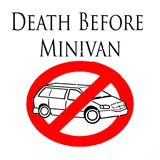So long, and thanks for all the tech.
 I’ve never been an Apple guy–I’m not cool enough. I prefer Linux for the same reasons that, when I make bread, I start by planting wheat in my backyard. Using a pipette. My (nerdy) objection to Apple computers, that they do not allow enough user customization, is the core strength of the iPhone. It just works–for 75 million people worldwide. And when it doesn’t work, you shut it off and turn it back on, and it works again. Automagically. In spite of Douglas Adams, Steve Jobs understood that technology should not be a word that describes something that doesn’t work yet.
I’ve never been an Apple guy–I’m not cool enough. I prefer Linux for the same reasons that, when I make bread, I start by planting wheat in my backyard. Using a pipette. My (nerdy) objection to Apple computers, that they do not allow enough user customization, is the core strength of the iPhone. It just works–for 75 million people worldwide. And when it doesn’t work, you shut it off and turn it back on, and it works again. Automagically. In spite of Douglas Adams, Steve Jobs understood that technology should not be a word that describes something that doesn’t work yet.
Although I distrust Apple computers, I do use an iPhone. Saying I use my iPhone is like saying Jonathan Stewart uses sarcasm or Obama may use a teleprompter now and then. I rely on it for news, for sports, for work, for play, for family. There is barely any aspect of my life that is not somehow improved or touched by my iPhone.
The truly amazing thing about Apple and Steve Jobs vision is that the iPhone is not even 5 years old and I cannot imagine a world without one. Today, there are more iPhones in use than American Express cards. There are about as many iPhones in the world as there are pet dogs in the United States. The adoption has been swift and relentless. During the 10th anniversary of 9/11, one thing that struck me (obviously not the salient point of the remembrances), was how it seemed like yesterday, but no one had an iPhone that day. At the time, I used this clunker:
 (If you’re old enough, you may remember trying to play a game on that thing. It was demoralizing. I mean, 84 x 48 pixels? Monochrome? It was like using a TRS-80!)
(If you’re old enough, you may remember trying to play a game on that thing. It was demoralizing. I mean, 84 x 48 pixels? Monochrome? It was like using a TRS-80!)
September 11, Peyton Manning’s first Superbowl, the Boxing Day Tsunami, Katrina, Obama’s first primary–none of these things were captured on a single iPhone. No one updated their facebook or twitter status from their phone. These events seem like yesterday, but they’re all older than the oldest iPhone. Do you remember going to the theater to see Pirates of the Caribbean (the third one), Spider Man 3, the premier of Transformers, or Shrek the Third? You didn’t buy tickets on your phone, and you didn’t watch any of the trailers on it either–the iPhone hadn’t come out yet, and almost everything before it was just a phone:
Technology has moved quickly over the past few decades, but nothing has left so large an impact in such a short period as the iPhone. Steve Jobs had a vision of the future and pushed technology as far as he could to make it happen today. He delivered an easy to use, electronic companion that didn’t just connect you with your friends over a tinny connection, but allowed you to take with you anywhere, your photos, videos, music, recipes, websites, high school sweethearts, and yes, Angry Birds.
The new iPhone 4S was revealed earlier this week, and like each of its ancestors, it is an amazing leap forward:
You talk, and it understands. It doesn’t just record or transcribe, it understands. Now, this is a promotional video, and as they say, any sufficiently advanced technology is indistinguishable from a rigged demo. But from the looks of it, the iPhone 4S is going to give Alan Turing a run for his money.
Steve Jobs’s vision, determination and skill took us from a world where a phone is just a phone, to one in which a device smaller than your wallet is indistinguishable from Jean Luc Picard’s ship’s computer. Steve Jobs pioneered personal computing, animation and business management, but his enduring legacy will be bringing the science fiction dreams of geeks everywhere, from face-to-face video calls to on demand video to near-sentient operating systems–all of it, to the masses for less than 2 days’ pay. As a good friend said today, if anyone has left the world a better place than he found it, it was Steve Jobs. He will be missed.


